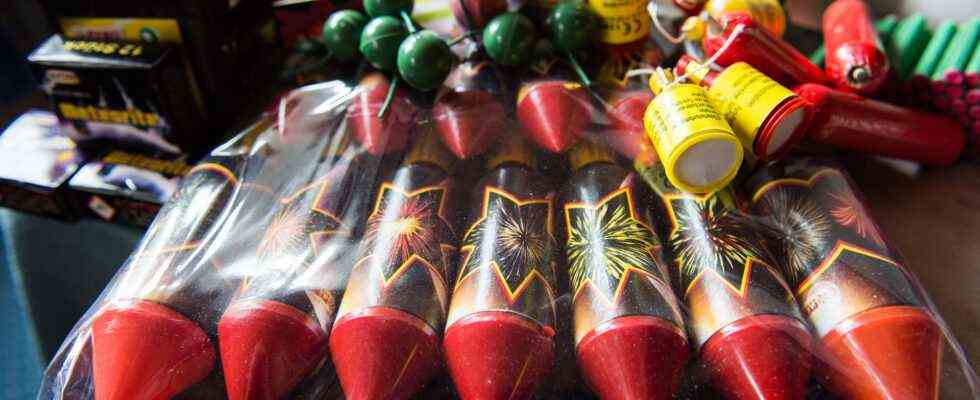As of: 12/30/2021 5:01 p.m.
Fireworks are not allowed to be sold in Germany this year either. The Berlin Administrative Court has dismissed lawsuits against the ban. Many pyrotechnics companies are facing the end.
Euro pallets with cardboard boxes line the aisles of the former bunker near the Saarland-French border. Oliver Wetzstein stands bent over a box in the dim light of the fluorescent tubes. He cuts the brown packaging tape with a carpet knife. Shrink-wrapped fireworks rockets come to light, always 27 per pack. He will not be allowed to sell them for this year’s New Year’s Eve.
In its last meeting of the year, the Federal Council approved a ban on the sale of New Year’s fireworks, as it did in the first Corona year. The federal and state governments agreed on this at the beginning of December. “In 2021 I will have financial losses in the high five-digit range,” explains Wetzstein, “the fixed costs of 5000 to 6000 euros per month are low compared to other companies. But if you have not made any sales for the second year in a row, that’s great a lot.” The native of Saarland turned his hobby into a profession 23 years ago and has been working as a freelance pyrotechnician ever since.
For the second time in a row, Oliver Wetzstein remains seated on a large part of his goods.
Image: Celine Kuklik / SR
Do not put additional strain on hospitals
The sales ban is intended to prevent the hospitals, which are at their limit due to Corona, from being additionally burdened by injured people. Fireworks of category F1, so-called youth fireworks, are excluded from this. These include cracked peas, small fountains or sparklers up to 30 centimeters in length. There is no general ban on burning – what exactly applies where is regulated by the federal states, cities and municipalities: For example, the Bavarian cabinet has decided to ban fireworks in “particularly popular places”. Such a ban also applies in Hesse and Saxony.
Wetzstein believes that the fact that people injured by fireworks pollute the hospitals is unfounded. Like the Federal Association of Pyrotechnics and Artificial Fireworks (BVPK), he refers to the hospital company “Vivantes”, according to which only five percent of hospital visits on New Year’s Eve are due to accidents with fireworks. The Berlin Administrative Court has dismissed an urgent action by the BVPK against the ban on fireworks. The Berlin-Brandenburg Higher Administrative Court has confirmed this decision.
“Not based on empirical data”
The association was disappointed, especially since there is no systematic recording of injuries on New Year’s Eve. “As an association, we have evaluated scientific studies and come to around two to three injured people per 100,000 inhabitants on the night of the turn of the year. Extrapolated to the clinics, that adds up to 1.8 to 2.5 injuries per emergency room,” explains Ingo Schubert, Managing Director of the BVPK . Since the approval of category F2 fireworks – including rockets and batteries – is strictly regulated, it is difficult to seriously injure yourself with them.
Therefore, the association assumes that there are minor injuries on New Year’s Eve, most of which could be treated on an outpatient basis. The serious injuries were due to illegal fireworks. He also quotes the President of the German Hospital Society, Gerald Gaß: It is not those who get injured when firing guns are a burden, but the people who get injured or get into an argument after too much alcohol. The BVPK is considering continuing the main proceedings against the sales ban.
Injuries to hands, eyes and hearing
In addition to hand injuries and burns, a number of other cases come to hospitals on New Year’s Eve. A survey of 75 eye clinics by the German Ophthalmological Society (DOG) also recently showed that eye injuries caused by fireworks have decreased by more than 80 percent in the past year compared to previous years. “We have established that sales bans and assembly restrictions clearly had a protective effect,” explains Hansjörg Agostini from the Department of Ophthalmology at the Freiburg University Medical Center.
Hearing can also be damaged on New Year’s Eve. The German Society for Ear, Nose and Throat Medicine, Head and Neck Surgery (DGHNO-KHC) estimates that around 8,000 people per year suffer a so-called bang trauma from New Year’s Eve fireworks. Hearing damage or tinnitus can be the result, sometimes permanently.
Losses of 200 million euros
On the other hand, it should be undisputed that the pyrotechnics industry has posted major losses for the second time. “We are assuming a total of 200 million euros for this year,” says BVPK spokesman Felix Martens. Around 500 companies with around 6,000 employees are affected. As a consequence, the fireworks manufacturer Weco from North Rhine-Westphalia closes its production site in Freiberg, Saxony, with 100 employees. The state bridging aid was insufficient to compensate for the loss in sales a second time. As a result of the sales ban, further costs and problems arise, for example through the transport and storage of the goods, says Comet Fireworks managing director Richard Eickel. Weco and Comet state that they generate 95 percent of their annual sales on New Year’s Eve.
Pyrotechnician Wetzstein earns 45 percent of his sales from fireworks. He also offers laser shows. However, the fireworks remain his passion: “In the industry, we need security that it will continue at some point. Otherwise we cannot plan,” says the Saarland native. The decision of the OVG Berlin-Brandenburg did not surprise him. Wetzstein hopes that major events, weddings and birthdays will take place again from May 2022. The 47-year-old estimates that 80 percent will not survive in his industry. Does he count himself among them? “Not at the moment. Time will tell.”

